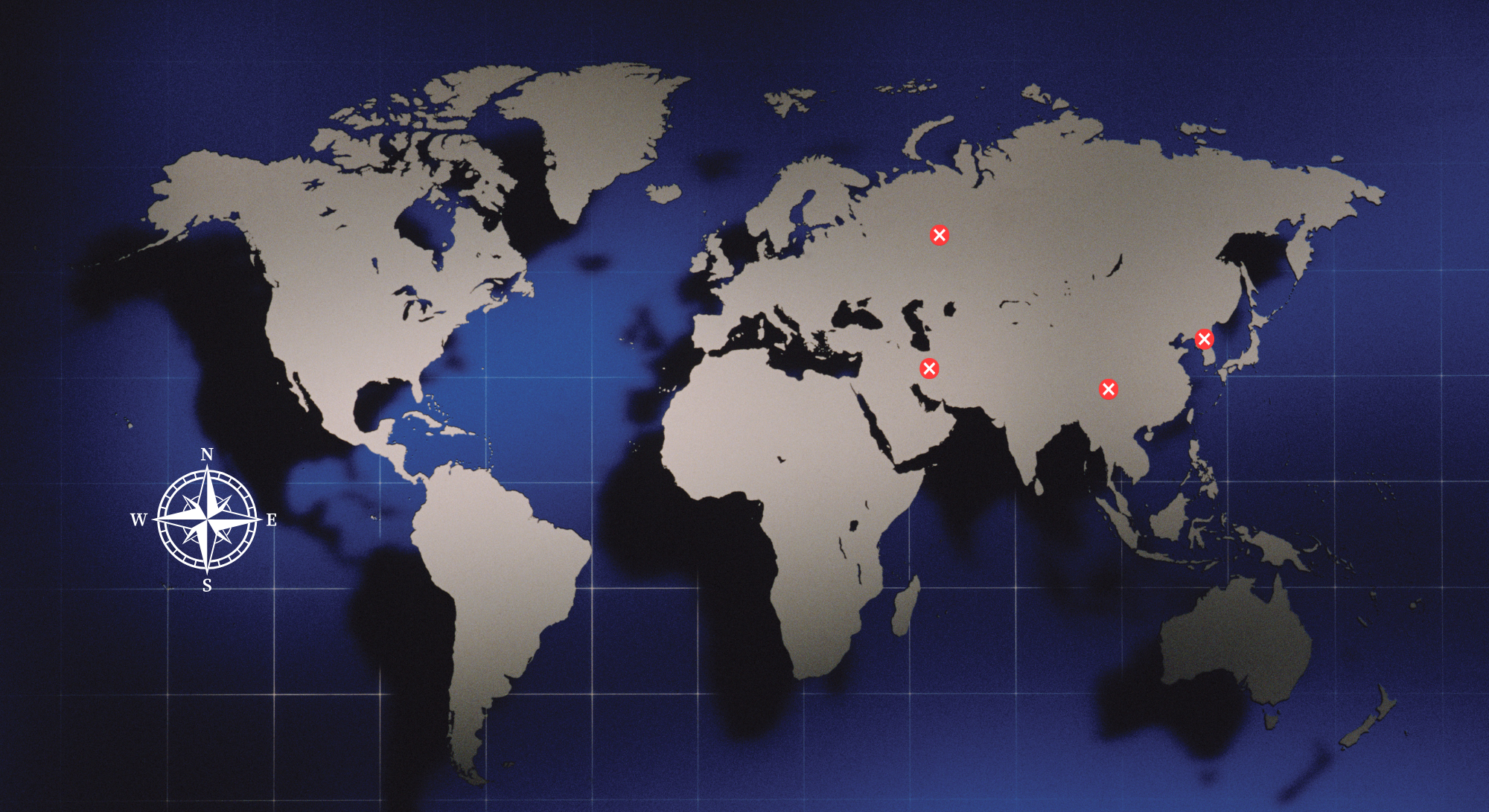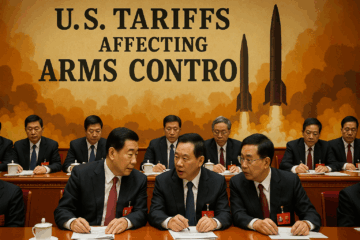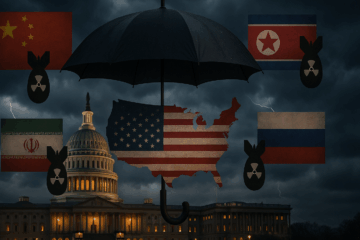Campaign rhetoric aside, the next president and America’s allies around the globe already face a multi-lateral nuclear alliance directed against them. Worse yet, that alliance is on track to become stronger and with a larger collective nuclear arsenal. This autocratic alliance includes China, Iran, North Korea, and Russia. Its members are already acting globally, and frequently in concert, against the West. With Iran reportedly weeks away from becoming a nuclear power, all four of these international malefactors will soon be able to launch individual or coordinated probes and attacks against American and ally interests while hiding behind their own nuclear arsenals.
Indeed, as of this writing such probes are already occurring. Sino-Russian aerial probes against Alaska recently occurred in the Arctic. While American officials claim this is the first time this happened, Chinese officials stated that this is the eighth such joint aerial probe. Moreover, the probe took place immediately following Sino-Russian bilateral naval exercises in the South China Sea and around Taiwan.
In a similar fashion, there is evidence that China is providing missile technology to North Korea. This follows the new mutual security pact signed by North Korea and Russia, which came after North Korea made itself a supplier of missiles to Russia in its war against Ukraine. Russian assistance to North Korea’s satellite program is also reportedly taking place.
In the Middle East, China’s negotiation of an agreement on Hamas-Palestinian Authority unity not only conforms to long-standing Russian objectives, but it also facilitates further Sino-Russo-Iranian influence among Palestinians—making a durable Middle East peace even less likely. Pyongyang’s willingness to proliferate nuclear and missile technology to Iran and a de facto Russo-Iranian alliance, only further destabilizes the region and makes a larger scale war more likely.
The same is true in Europe where China emerged as the primary source of Russian revenues, defense technologies, and diplomatic support for its war on Ukraine. Without Chinese support, Russia would be hard-pressed to continue the war. At the same time, numerous accounts show that Russia is engaged in cyber war against Europe, attacking infrastructure and cyber networks. Russia is also planning assassinations of key figures and other mayhem within the countries of the North Atlantic Treaty Organization. Russia is not alone in engaging in these behaviors. While the attacks on France’s national railway system on the eve of the Olympics was very likely a Russian plot, Iran is concurrently threatening Israeli athletes at the Olympic games through cyberattacks.
The number of global attacks and coordination among these four actors, all of whom use nuclear weapons to deter the West from responding to their gray zone attacks, is increasing. Once Iran fields its own nuclear arsenal, which seems increasingly likely, more terror campaigns against Israel, other Middle East states, and international shipping (by Iranian proxies) is likely. Indeed, the Houthis granted safe passage to Chinese and Russian ships in the Red Sea while Moscow is considering giving them anti-ship missiles. These facts also raise the issue of their use of cyber and hacking devices, if not GPS, to direct and track ships in the Red Sea.
Accordingly, the West faces a multi-domain threat linking all the domains of warfare, including nuclear escalation. These autocracies already incorporated nuclear deterrence, if not escalation, into their strategies against the US and its allies in Asia, Europe, and the Middle East. North Korea, as well as China and Russia, is building a larger and more diversified arsenal. Soon, North Korea will field a nuclear triad of fighter-bombers, intercontinental ballistic missiles, and submarine-launched cruise missiles.
As a result of their policies, there is virtually no hope of arms control in the near future. China’s recent walkout from nuclear talks exemplifies the utter impossibility of arranging arms control with either Beijing or Moscow. By the same token nonproliferation and the nonproliferation treaty are evidently on their last legs. Beijing’s announcement of its commitment to that treaty’s renewed credibility is thus a grim joke given its ongoing record of support for proliferation. For the next administration, which must deal with facts rather than wish-fulfillment in its defense policy, it is clear that a sustained program of conventional and nuclear modernization, if not an actual increase, is necessary. Moreover, nuclear proliferation appears increasingly likely.
If Iran goes nuclear, the pressure on Saudi Arabia to follow suit increases exponentially. Egypt and Turkey may also follow suit, leading to a Middle East that is equally unstable, but with more nuclear powers.
South Korean public opinion is apparently increasingly supportive of an independent nuclear arsenal, which would lead Japan to follow suit. In short, China, Iran, North Korea, and Russia are all making the world a less safe place as they challenge world order.
While Americans already live in interesting times, the times are likely to become even more interesting as they become more threatening. The United States will face a nuclear-armed autocratic quartet that is focused on supplanting American power. That quartet is also likely to be more dangerous than ever before because the threat, if not the actual use of nuclear weapons, offsets their conventional inferiority and increases their war-making power.
The fevered rhetoric of the current presidential campaign will soon end. The intractable realities will neither end nor give the next administration any respite. They will challenge the nation and force Americans to turn their inward gaze outward.
Steve Blank, PhD, is a Senior Fellow at the National Institute for Deterrence Studies. The views expressed are his own.
About the Author

Stephen Blank
Stephen Blank, PhD, is an internationally recognized authority on Russian foreign policy matters with over 1200 published articles, fifteen books, and twenty-plus years as a call-first consultant to media worldwide, private firms, think tanks and the Congressional and Executive branches of the United States government. His expertise spans and incorporates the Russian, Soviet and post-Communist periods and speaks and writse extensively on information warfare, energy politics, foreign policy, defense policy and strategy, and American, European and Asian security concerns.
Stephen is currently an independent speaker, consultant, and writer as well as a Senior Fellow at the National Institute for Deterrence Studies. Previously, Stephen was a member of the U.S. Army War College faculty for over two decades, serving as the Douglas MacArthur Professor of Research from 1998-2001. He has had the privilege of consulting for the CIA, and the US Army, and chaired international conferences in the United States, UK, Italy, and the Czech Republic.
SPECIALTIES:
► Russian Foreign Policy
► Russian Defense Policy
► US Foreign Policy
► European and Asian Security
► International Relations
► Defense Strategy
CONTACT INFO:
Email: traininblank@aol.com or blank@afpc.org or drstephenjblank@gmail.com
Office: 202-543-1006
Home: 301-681-2964





The question was asked on the youtube critique of the article . Why the alliance now?
The defintion of the alliance between Russia, China Iran North Korea, an alliance of the disenfranchised as the late Zbigniew Brzezinski said right before his death in 2017 the greatest danger for the west is a grand coalition of China and Russia united not by ideology, nor by politics but by common grievance with Iran and North Korea joining the club after his death. What is the common grievance? The Rules Based International Order in effect since the end of ww2 exclusively written by and for liberal democracy, The grand coalition nations believe they never had any say how the rules were written, interpreted or executed.